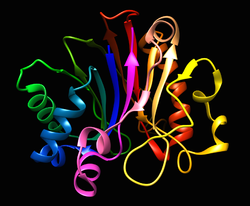Deoxyribonuclease I (DNAse I) is a versatile enzyme (endonuclease) that catalyzes the hydrolytic cleavage of the adjacent phosphodiester bonds of pyrimidines nucleotides (deoxycytidine and deoxythymidine), causing these bonds to degrade, releasing di/tri/oligo phosphorylated nucleotides as products. It is coded by the human DNASE1 gene.
It is a powerful research tool in the field of molecular biology for DNA manipulation. It can be used:
- To create a library of fragments of DNA sequences for in vitro use of recombination reactions.
- In the degradation of contaminated DNA after RNA isolation;
- In the identification of the protein binding sequence in DNA (DNAse I footprinting).
 |
| Figure 1 DNAse I diagram. |
The most common buffer components for the use of DNAse I are 10mM Tris-HCl; 2.5 mM MgCl2; 0.5mM CaCl2; pH 7.6 at 25ºC, and we must store this solution at -20ºC.
References:
R. A. Bowen; Laura Austgen; Melissa Rouge (2000). "Restriction Endonucleases and DNA Modifying Enzymes". Nucleases: DNase and RNase. Biotechnology and Genetic Engineering.
National Center for Biotechnology Information, U.S. National Library of Medicine (2018). DNASE1 deoxyribonuclease 1 [Homo sapiens (human)]. Retrieved at november 13 2018, from: https://www.ncbi.nlm.nih.gov/gene/1773
Thermo Fisher Scientific. (2016). DNAse I Demystified. Retrieved at november 13 2018, from: https://www.thermofisher.com/pt/en/home/references/ambion-tech-support/nuclease-enzymes/general-articles/dnase-i-demystified.html
New England Biolabs. (2018). DNAse Reaction Buffer. Retrieved at november 13 2018, from: https://international.neb.com/products/b0303-dnase-i-reaction-buffer
Jazzlw. (2016). DNAse I. Retrieved at november 13 2018, from: https://commons.wikimedia.org/w/index.php?curid=47824954
Genes e Genomas | Biologia Aplicada | Universidade do Minho
A86073 Ana Beatriz Maia | A85219 Ana Rita Campos
A84133 Jorge Gonçalves | A83512 Vera Oliveira
Deoxyribonuclease I (usually called DNase I), is an endonuclease coded by the human gene DNASE1. DNase I is a nuclease that cleaves DNA preferentially at phosphodiester linkages adjacent to a pyrimidine nucleotide, yielding 5'-phosphate-terminated polynucleotides with a free hydroxyl group on position 3', on average producing tetranucleotides.
ReplyDelete